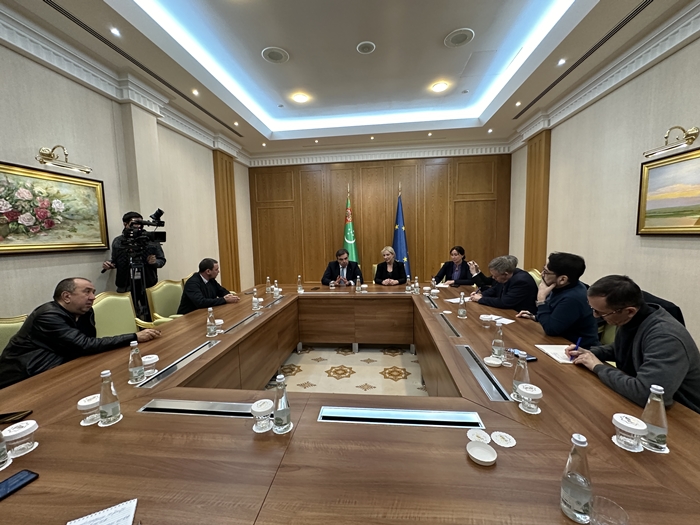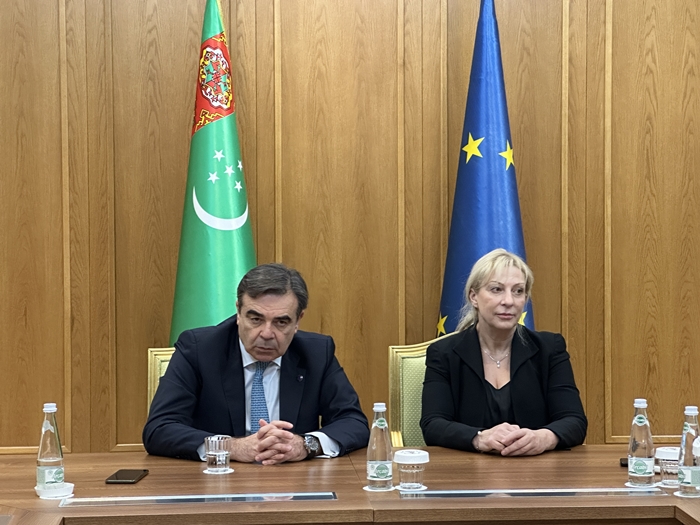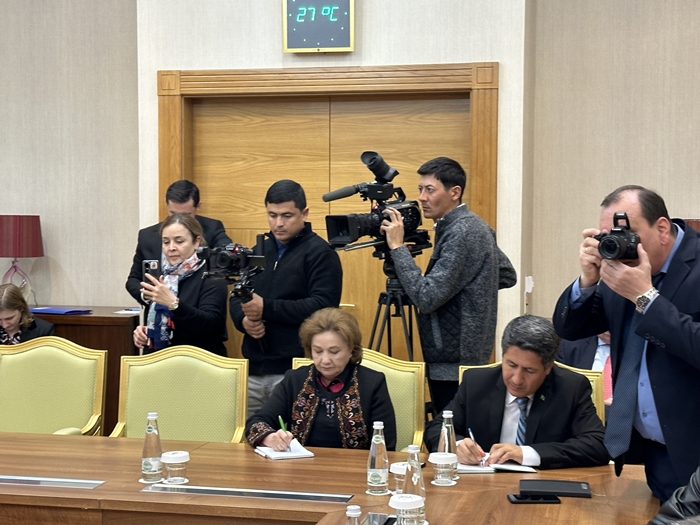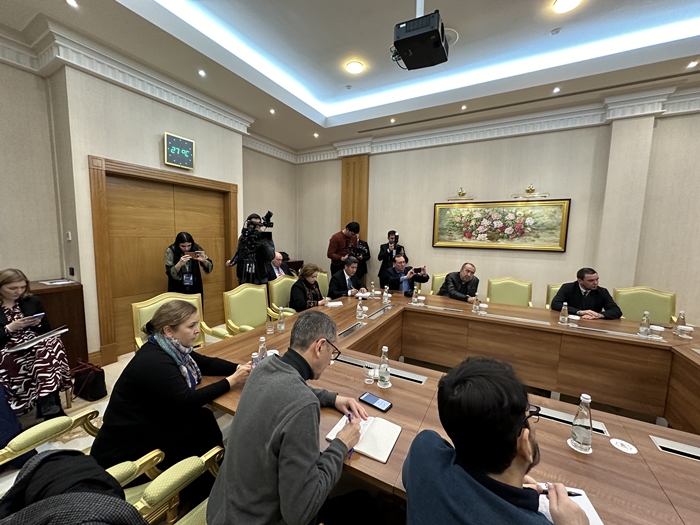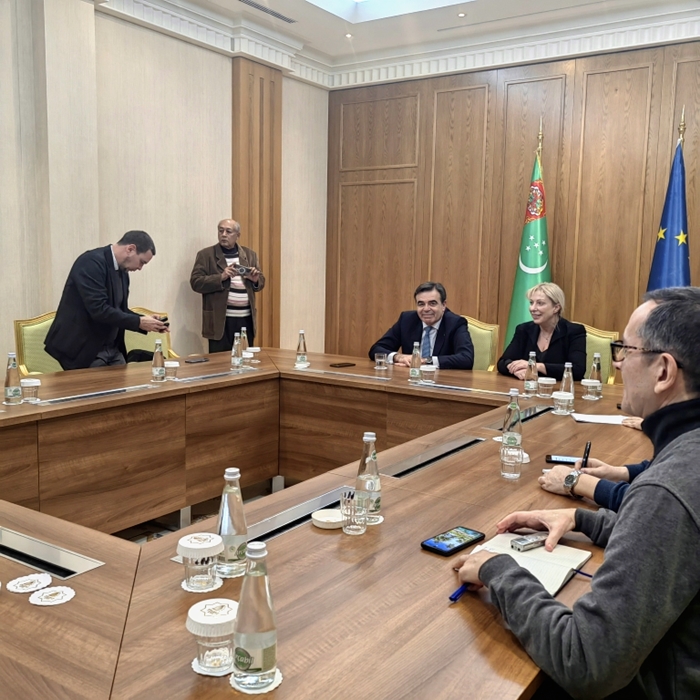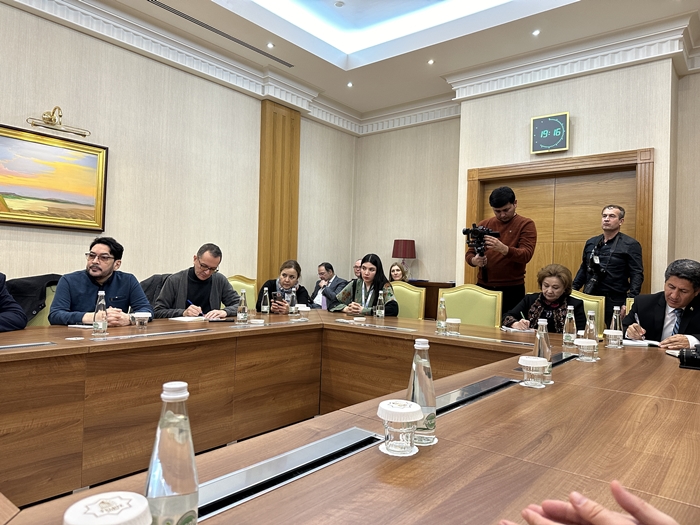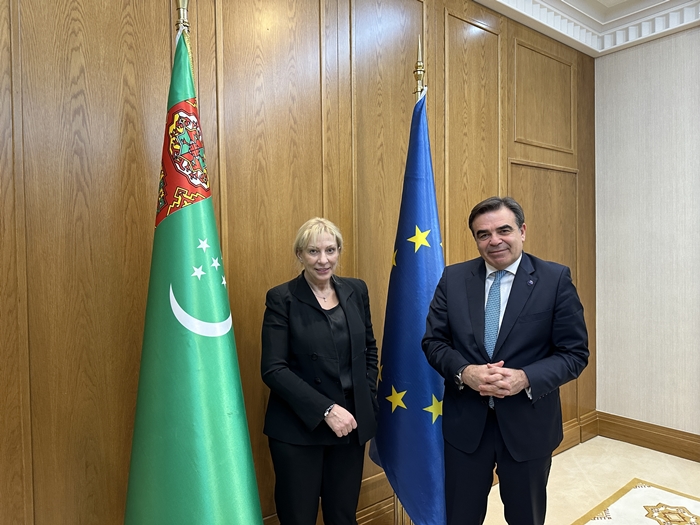Vice President of EC completes his Central Asia visit with last stop in Turkmenistan
Margaritis Schinas, the Vice President of the European Commission (EC) completed his tour of the five Central Asian countries with the last stop in Turkmenistan on 17 January 2023.
In Turkmenistan, he had several meetings including with President Serdar Berdimuhamedov and the foreign minister Rashid Meredov.
Press conference by Margaritis Schinas
He addressed a press conference, wrapping up his tour of the region.
Here is the slightly abridged transcript of his conversation with the media:
I have just concluded something that has been done for the first time ever – a member of the EC visited all five countries of Central Asia in one go.
On behalf of the EU, we are engaged so actively because if you ask me to show a place of the world where positive changes are happening, this is clearly Central Asia.
And, for us in the EU, this is really important. It matters a lot, especially in these times of geopolitical turbulence, when the world around us is becoming more unstable, more insecure.
For us, it is important that in this part of the world there is the ability and spirit of positive change.
And, I am not empty-handed. I am not coming only with words. I am coming to take forward a meaningful agenda of investments, growth, around the area of connectivity.
We have a new instrument for that – the Global Gateway. This is not about the Europe signing the cheque. It is about attracting investment, involving international financial institutions, private investors, and job creation.
Central Asia is ideally placed to make good use of the Global Gateway initiative because it is a natural bridge that connects the East with the West.
So, in my meetings with the political leaders at the highest level of the five governments of Central Asia, I was delighted to receive the specific interest, rather enthusiasm, for this new scheme of connectivity.
And, in two weeks, on 29 and 30 January 2024, precisely to translate this idea into tangible, emerging realities, there would be major investment forum.
I am delighted that all the five countries of the region would be represented at the investment forum at the political level.
We have also invited our bank, the European Investment Bank (EIB), international financial institutions like EBRD, and most importantly the private investors and investment funds.
So, this is happening. That is why I wanted to be here a few days before the investment forum to assure the governments that we mean business.
The final point and then I am happy to answer the questions.
Our approach to Central Asia is not a one-off; it is not touch and go. We are coming to engage in the medium- and long-run. We are here to stay – partners in building a better world in geopolitics but also as catalyst for economic reforms, development of the infrastructure, cooperation on raw materials, and protecting water and the natural resources.
This is a long-term relationship we are building.
Answering a question by nCa about the primary outcome of the regional visit, the EC vice president said that I am very encouraged by the fact that my interlocutors at the highest political level clearly understand the EU’s interest in the region positively.
They are very willing to work with us on this connectivity agenda and on the economic cooperation and investments in general.
And, I also got this feeling from my discussions and contacts here that all of my interlocutors understand the EU as a force of good.
There were several questions by Reuters, AP, Orient, and Neutral Turkmenistan about the Trans-Caspian pipeline, and its prospects and options.
Here we are merging the answers by Schinas to maintain a coherent narrative.
Energy networks, pipelines, are not decided by the politicians. There must be the strategic interest but there must also be a market (commercial) interest.
So, I did not come to discuss the individual projects. I came to present the architecture of the Global Gateway, within which investments and the individual connectivity projects can be implemented.
And clearly, there is a huge potential for the connectivity projects between the Central Asia and the European Union.
But we hope that we will create the conditions within which the political support can be built and investments can be attracted.
This will not happen in vacuum, in laboratory conditions.
And clearly, here in Turkmenistan – a gas producer and exporter – we are in contact and in discussion on these issues.
In the EU we are building what we call the Energy Resilience. So we want to make sure that we have the energy we need, from the sources that are available to us. But at the same time, as you certainly know, the EU is leading by example in greening the energy mix, in compliance with the climate change requirements.
[Here, Ambassador Beata Pęksa, the head of the EU delegation to Turkmenistan briefly interjected. She said that we are talking with Turkmenistan about all the options. We are in contact. — A few of her words are not audible on our recording. Ed.]
[Back to the conversation by Margaritis Schinas]
Let me repeat in a different way what I told you. Pipelines are not built by the commissioners. But clearly, we are creating a system within which the investment decisions will be facilitated. And, of course, we are in continuous discussion with the gas producing countries like Turkmenistan to see how can we further our cooperation.
With the Global Gateway we are building an eco-system for investment on transport connectivity projects that serve the Trans-Caspian logic.
We do not create a system of third category and second category connectivity projects. Everything that serves the East-West Trans-Caspian dimension in connectivity is eligible.
Clearly, other than our money there would also be the private investors’ money. The investors would clearly go to the projects that are more mature than others.
So, in the investment forum in Brussels our priority would be to bring everybody together to discuss these questions on the projects of transport connectivity.
On a question by Orient about the outcome of the meeting with the president of Turkmenistan, Schinas said that my discussions with the president were around the same agenda as I am discussing with you; that is the menu, if you like.
I found the president very informed of our role and intentions and I was delighted to hear that he is fully committed to the Global Gateway logic.
We already had two regional Global Gateway initiatives in the region, one on the digital connectivity and the other on the water and natural resources.
I also informed the president of the role that the European Investment Bank – our investment bank – can play to facilitate a country framework agreement with Turkmenistan, which will be a door opener for further investments.
CentralAsiaNews asked whether there had been any conversation about the youth, to which the EC vice president said that connectivity was the centre of gravity of the discussions but we did not forget to mention the anthropocentric part, the EU-CA cooperation. I discussed this specifically with the minister of foreign affairs. I accepted his invitation to look into more, enlarged, Erasmus Plus chapter for Turkmenistan.
With Central Asia, and Turkmenistan in particular, there are also two other areas of cooperation – on EU-CA Women cooperation, and bringing the university rectors from CA and Europe to enhance the educational cooperation.
So, not only the highways, bridges, ports, and infrastructure, but also the people.
Press release by the EU delegation in Turkmenistan
Visit of the delegation of the European Union led by Vice-President of the European Commission, Margaritis Schinas
Ashgabat, 17 January – On 17 January 2024, a delegation of the European Union led by Vice-President of the European Commission, Margaritis Schinas officially visited Turkmenistan as part of its wider tour to Central Asia, lasting from 15 to 17 January.
The visit comes ahead of the “Europe – Central Asia Investors Forum”, which aims at strengthening connectivity by developing transport routes within Central Asia and the European Union. It is also a testament to the growing partnership between the EU and the region.
During the visit, VP Margaritis Schinas met with President of Turkmenistan H.E. Mr. Serdar Berdimuhamedov, and Deputy Chairman of the Cabinet of Ministers, Minister of Foreign Affairs of Turkmenistan H.E. Mr. Rashid Meredov.
At the meeting with the President and the Minister of Foreign Affairs, key issues such as cooperation in the EU-Central Asia format, engagement of the Central Asian countries in the EU Global Gateway initiative, as well as the participation of Turkmenistan in the upcoming Investors Forum were discussed.
When discussing EU-Turkmenistan partnership, VP M. Schinas welcomed Turkmenistan’s efforts in the process of accession to the World Trade Organization and its commitment to becoming a member of a multilateral trading system. He congratulated Turkmenistan for joining the Global Methane Pledge at the COP28 in Dubai. Additionally, VP M. Schinas underscored the EU’s commitment to human rights as a fundamental principle and commended Turkmenistan’s engagement in the Annual Human Rights Dialogue. Both sides underlined the need to observe international law and the UN Charter and the need to refrain from the use of force in bilateral and international relations.
Following the visit, at the press briefing, Vice-President Margaritis Schinas said: “I am proud to be the first Commissioner to visit Turkmenistan since the beginning of this European Commission five years ago. Turkmenistan is an important partner of the EU in Central Asia. My visit was the opportunity to discuss Global Gateway, the EU’s main investment strategy with partners worldwide. The Global Gateway is about investing in our mutual interests and is ideally suited to Central Asia given that it is already the world’s gateway between East-West. And it was the occasion to give a new impetus to EU-Turkmenistan relations across the board.”
What is Global Gateway?
The Global Gateway is the EU’s contribution to narrowing the global investment gap worldwide. It is in line with the commitment of the G7 leaders from June 2021 to launch a values-driven, high-standard and transparent infrastructure partnership to meet global infrastructure development needs. The Global Gateway is also fully aligned with the UN’s Agenda 2030 and its Sustainable Development Goals, as well as the Paris Agreement.
https://international-partnerships.ec.europa.eu/policies/global-gateway/global-gateway-overview_en
Between 2021 and 2027, Team Europe will mobilize up to €300 billion of investments for sustainable and high-quality projects, taking into account the needs of partner countries and ensuring lasting benefits for local communities. This will allow EU’s partners to develop their societies and economies, but also create opportunities for the EU Member States’ private sector to invest and remain competitive, whilst ensuring the highest environmental and labor standards, as well as sound financial management. /// nCa, 18 January 2024
